With an increasing purchasing power and digitalization of its society, China’s e-commerce market has naturally been growing exponentially while embracing several innovations for both consumers and merchants. Chinese companies have thus made a real run to become the best e-commerce platform in China, thanks to the development of cutting-edge technologies. A big part of this innovative culture can be explained by the competitiveness of the market as well as a demanding consumer base.
One of the most known online marketplaces in China market is definitely Tmall and the majority of foreign brands are aiming to sell their products on that platform. This is why, in today’s article, we explain in detail how to open a merchant account on Tmall and sell your products through Tmall and Tmall Global store to Chinese consumers.
Need a cost effective TP (Tmall Partner) to sell in China?
We are an Official Tmall Partner e-commerce Agency. Our Services: E-Commerce, Search Engine Optimization, Advertising, Weibo, WeChat, WeChat Store & PR.
E-commerce: China’s Key Market
China stands as the dominant force in the global e-commerce arena, commanding nearly half of all worldwide transactions. According to eMarketer’s data, the number of digital buyers in China surpassed an impressive 845 million by the end of 2022, driving transactions amounting to a staggering $3.33 trillion in 2023. Projections indicate that by 2024, these figures are expected to soar to an even more remarkable $3.56 trillion.
In a remarkable shift, China took the crown as the largest e-commerce market in 2021, surpassing the United States, with an impressive revenue of $1.5 trillion.
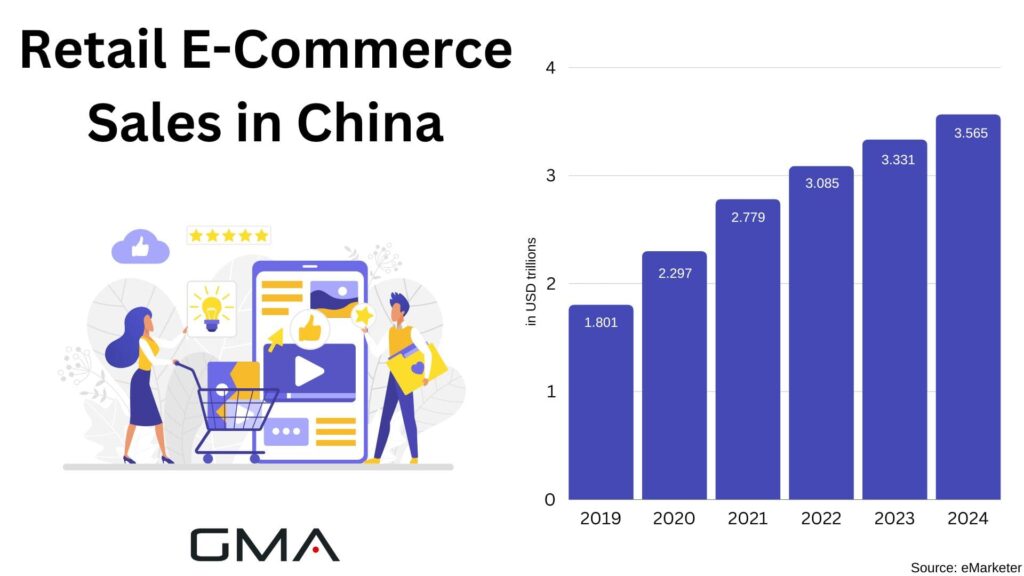
China: A Very Digitalized Market
With a shift toward new technologies and internet-related tools, the Chinese population is one of the most connected in the world, from purchasing products on the internet to paying for their cab. Thus, it is no surprise that e-commerce platforms were increasingly able to attract Chinese consumers that don’t want to spend time in brick-and-mortar stores.
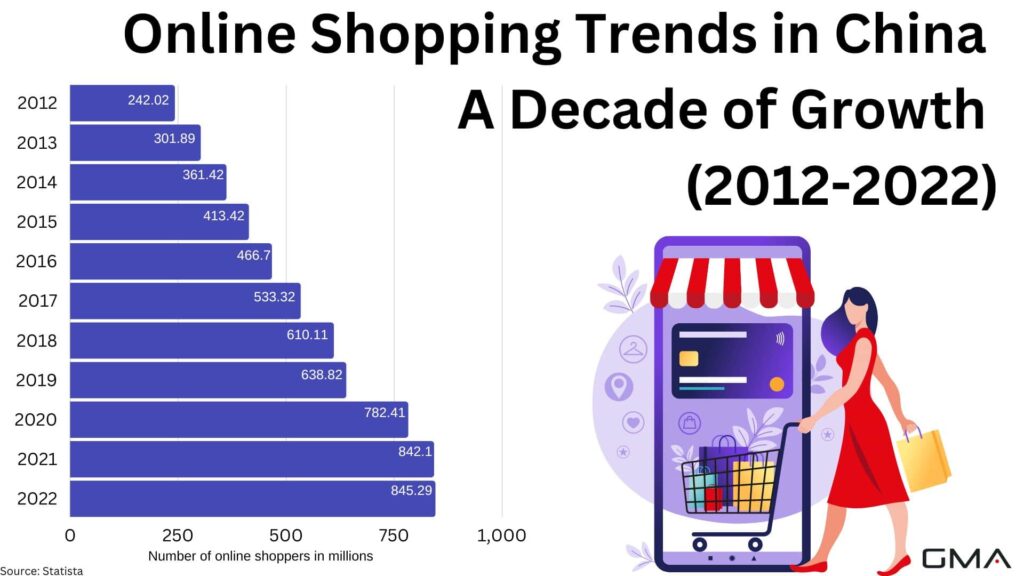
As seen in the above graphic, the number of online shoppers in China keeps increasing, reaching more than 845 million online shoppers in 2022, following the Covid-19 pandemic. As a matter of fact, with the Covid pandemic, consumers have shifted from offline to online purchases on e-commerce platforms. Moreover, in order to alleviate the tough competition, many brands are sending e-vouchers to their followers through social media, which attracts even more Chinese consumers.
From below 34 million users in 2006, the number of online shoppers in China has experienced an exponential surge, reaching over 466 million a decade later. This remarkable growth has fueled the immense expansion of China’s e-commerce sector. As of 2022, the digital buyer penetration rate in China has approached nearly 59 percent.
In recent years, China has held the position of the world’s second-largest e-tailing market, trailing only the U.S. As of 2022, the gross merchandise volume (GMV) of online shopping in China had reached approximately 13.79 trillion yuan. It was projected that the volume of B2C e-commerce sales in China would exceed 1.3 trillion U.S. dollars by that time.
Some of the factors contributing to the e-commerce growth are increased internet penetration, and always increasing spending power, but also the expansion of several e-commerce platforms that are gaining strength.
About Tmall: One of the Leading E-Commerce Platforms in China
Founded in 2008 under the famous Alibaba group, Tmall (天猫), is a subsidiary of the e-commerce website Taobao (淘宝网). Its target market is primarily B2C (Business-To-Consumer).
Tmall’s concept is ambitious and wise as it allows both local Chinese and international companies to sell their products through the platform in mainland China, Hong Kong, Macau, and Taiwan. Tmall stands out from its competitors thanks to its strict standards in terms of quality and renown.
Tmall had established itself as the leading B2C e-commerce retailer in China, boasting the highest gross merchandise volume (GMV) among its competitors.
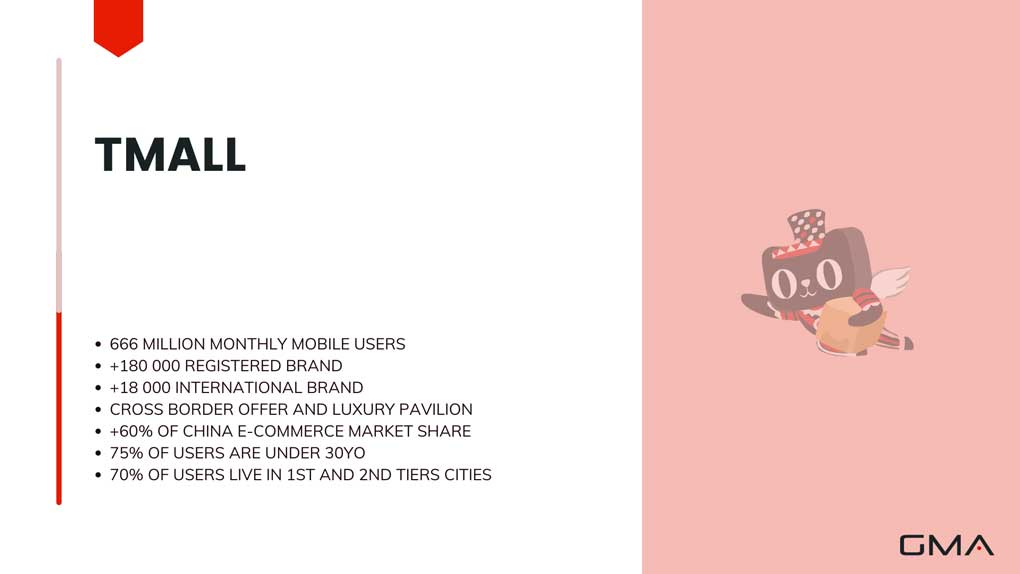
Through Tmall Global, which operates in the cross-border e-commerce sector, retailers can directly sell their products to Chinese consumers using certified warehouses in China’s free trade zones. This approach opens an excellent opportunity for foreign brands to enter the Chinese market without dealing with complex logistics or setting up physical stores.
This virtual shopping center hosts many international brands, such as Gucci, Calvin Klein, Burberry, Lancôme, L’Occitane, etc.
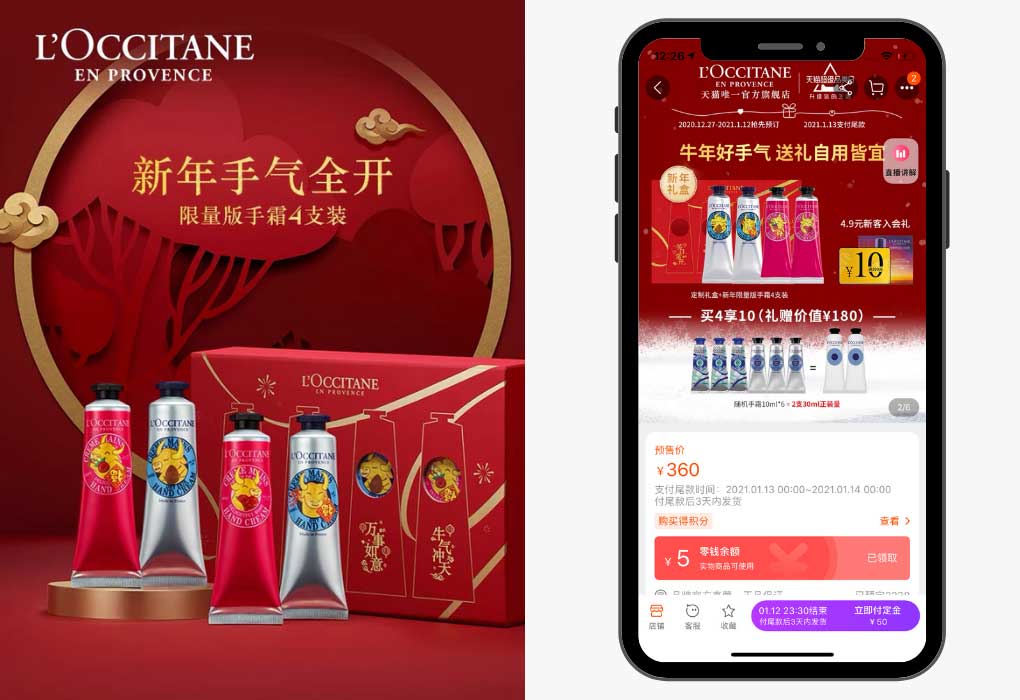
Over the years, Tmall was able to grab the majority of China’s e-commerce market shares, establishing itself as the most popular Chinese e-commerce website and becoming the best online gateway for local and international retailers.
Tmall.com enables brands to sell their products and services directly to consumers in China. In the same way as Taobao, Tmall uses Alipay’s payment system. Nonetheless, one of the main differences between Taobao and Tmall is the products’ quality. As a matter of fact, Tmall’s commitment to providing high-quality products is much more important than Taobao, as merchants have to be approved in order to set up a store on the platform.
Moreover, to operate on Tmall, a company is required to use what is called a “Tmall Partner”, which is a third-party company that helps to provide assistance in onboarding and operation for businesses that are working on Alibaba’s platforms such as Tmall.

The Benefits of Opening a Tmall Account
- Excellent investment opportunity in China’s fast-growing e-commerce industry.
- Direct access to millions of Chinese consumers without the need for physical stores or local distributors (Tmall Global platform).
- Significant cost savings and increased control over brand messaging.
- Ideal for international brands and retailers seeking to open a brand flagship store.
- Tap into China’s growing middle class and expand its customer base significantly.
- Abundant growth opportunities with Tmall Global‘s focus on attracting global brands and expanding international reach.
- Cross-border logistics and Chinese international customs support for seamless operations.
- Access to powerful marketing tools provided by the Alibaba Group.
- Build brand awareness in the Chinese market.
- Drive targeted traffic to stores for increased sales potential.
- Chinese language customer support system for foreign merchants.
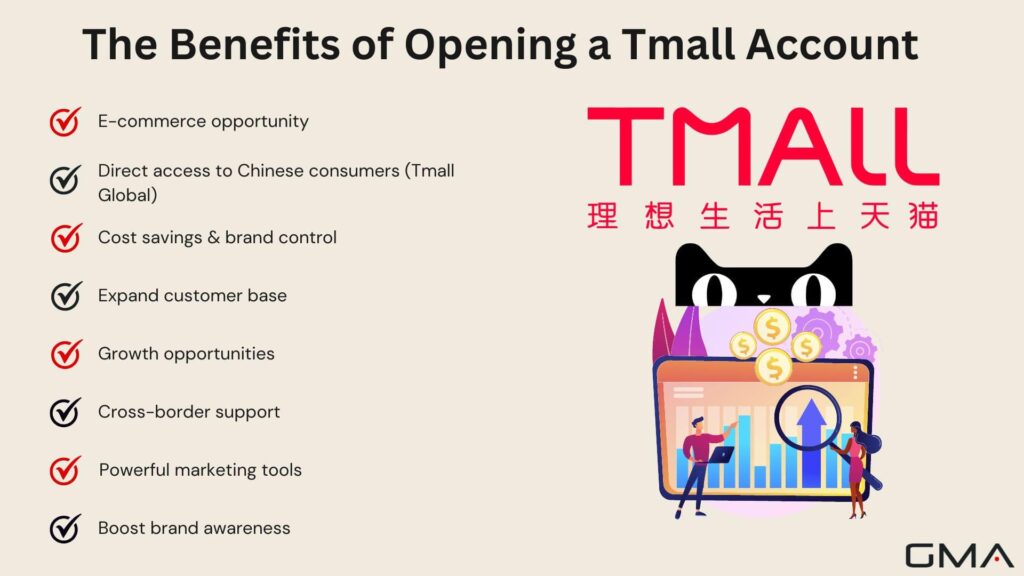
Tmall vs Tmall Global
Tmall, being the largest domestic B2C online platform in China, offers businesses the opportunity to directly sell to millions of customers across the country. As an open platform marketplace, Tmall provides the infrastructure for hosting your storefront and grants unfiltered access to hundreds of millions of shoppers.
Running a storefront on Tmall is similar to operating your own B2C eCommerce website. On the other hand, Tmall Global caters to international businesses with no physical presence in mainland China. This means you don’t need a physical store, warehouse, Chinese authorities’ registration, or a Chinese business license to set up an online store on Tmall Global. It allows you to tap into a vast and profitable consumer base in China who are enthusiastic about online shopping.
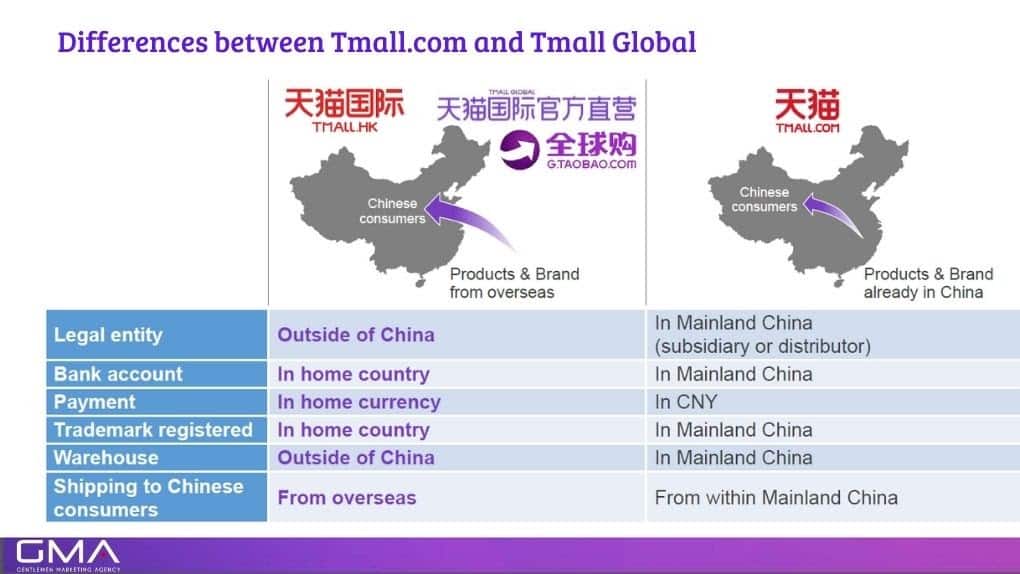
How to Open a Merchant Account on Tmall.com
First of all, you have to know that in China, the possibility to open a shop on the top e-commerce platform does not only depend on your motivation but mostly on how your brand appears and the potential it will have on the platform.
If you want to get the opportunity of selling your products on one of the most consulted e-commerce websites in the world, you will need to show what you have to offer and convince Tmall that you have the potential to attract and retain Chinese consumers’ interest.
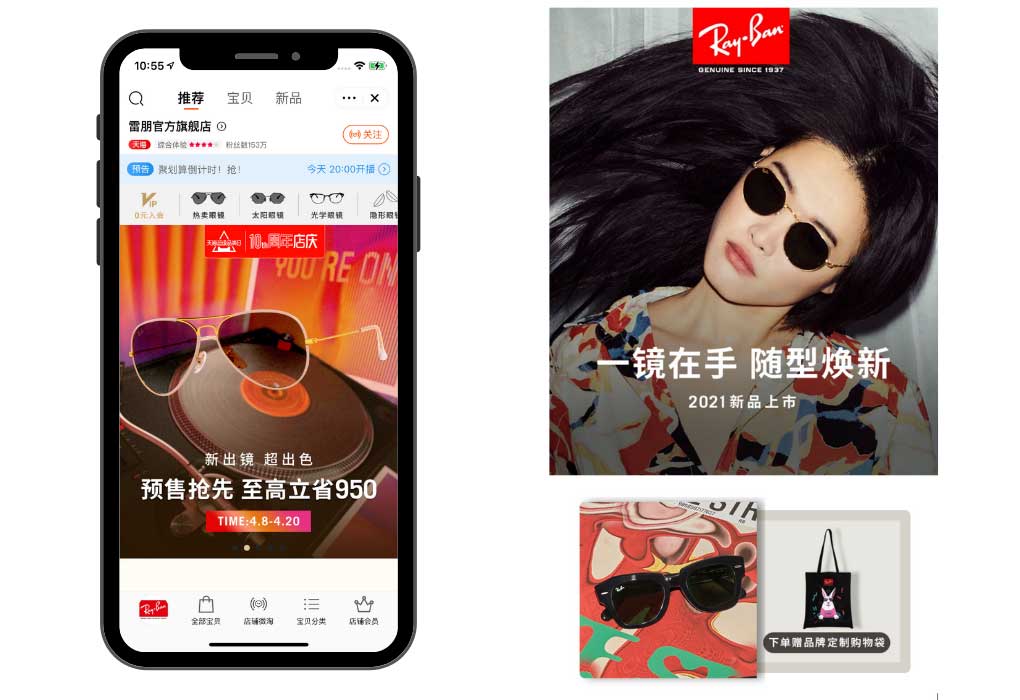
Then, in terms of registration, Tmall requires its merchants to have official Chinese documents as well as to have their products registered with the local authorities. This is the reason why most of the foreign brands you’ll see on Tmall tend to be international and F500 brands that already have an entity in China (We can help you register your company in China and get a license for your product categories!).
Requirements for Opening a Merchant Account on Tmall
- Only companies located in Mainland China and with a Chinese retail business license can apply to open a store on Tmall.com
- Marketers have to submit the necessary information including documents that confirm the reliability, genuineness, and existence of the company and its products.
- Products must be located within China in order to send the order quickly to consumers.
- Tmall stipulates that vendors must ship an order within 72 hours after the purchase.
- 7 days after receiving the item, consumers have the right to return it for a refund.
Different Types of Accounts Available on Tmall.com
Brands can open three kinds of stores: Authorized stores, Specialty stores, and Flagship stores.
Authorized Store
This means that the merchant holds the authorization documents from the brand owner to open a shop on Tmall.com. Authorized stores can be opened under the following circumstances:
- Shop authorized to sell branded products,
- Store authorized to sell products of multiple brands, but all brands belong to the same entity (special approval from Tmall is required).
Furthermore, the authorization documents of the owner of the trademark (trademark) must not be subject to regional restrictions.
Specialty Store
By using this method, merchants are able to sell products of two or more brands that belong to the same product category. Specialized stores can be opened under the following circumstances:
- The store sells products of two or more brands that the merchant does not own,
- The store sells products of a brand (trademark) owned by the merchant and also sells products of a brand not owned by the merchant,
- The store sells products of two or more brands owned by the merchant.
A single merchant can apply to open only one specialty store within a single product category.
Tmall Flagship Store
In recent years, Tmall has been mainly focusing on providing value to a new potential set of customers, especially those living in lower-tier cities, instead of just targeting top-tier cities. Thanks to this strategy, Tmall has been able to increase its customer base, as well as a greater power in the e-commerce market.
Tmall is not only a gateway for a brand’s debut, but it is also a powerful platform of innovation in terms of technology, and it shows how e-commerce will look in the future. By using a flagship store, it means that the merchant is the owner of the brand or has the exclusive authorization of the brand owner to open the store.
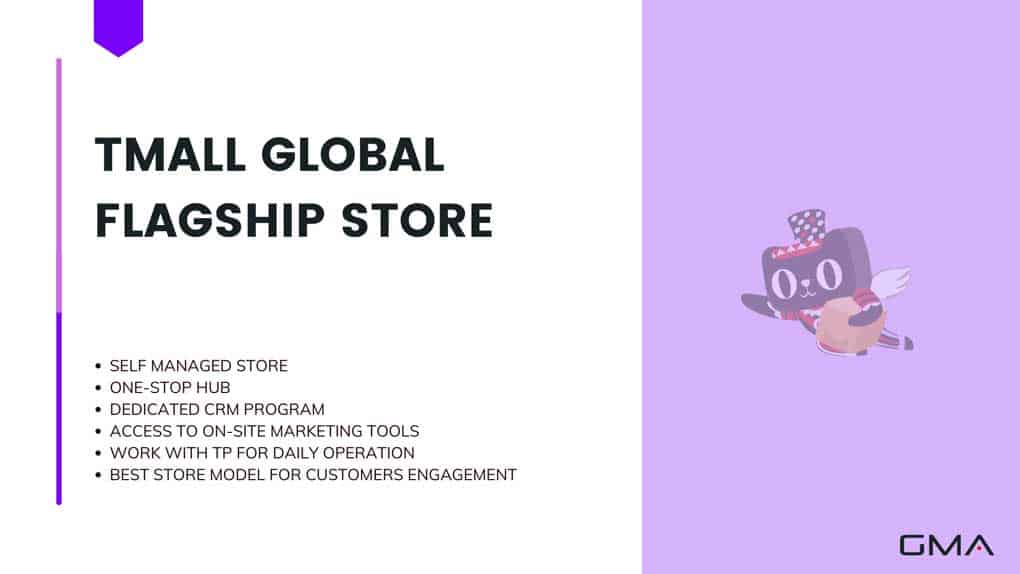
If you want to open a flagship store on Tmall.com, you will have to provide the following documents:

Tmall Registration and Running Fees
If you want to sell your goods on Tmall, be aware that the fees are quite high (although, in most cases and with the right strategy it is totally worth it)
- To open the store, a US$25,000 security deposit is required, refundable upon store closure.
- Tmall charges a fixed yearly fee based on the highest product category fee, ranging from $5,000 to $10,000 per year.
- Sales commission for Tmall can represent 2-4% of sales (although most of the time it will be around 2% and 5%).
- Finally, as a subsidiary of Alibaba, Chinese consumers are purchasing with Alipay, so it will represent 1% of your sales.
How to Open a Merchant Account on Tmall Global
The process to open a merchant account on Tmall Global is the same as for Tmall.com.
Contact us to open your merchant account on Tmall Global
Requirements for Opening a Merchant Account on Tmall Global
In order to open a merchant account on Tmall Global, you will first need to determine the compatibility of your brand by following these steps:
- Assess prerequisites
- Determine needs from third-party service providers (TPs) more
- Create logistics plan
- Prepare necessary documents
- Reserve technical resources
- Begin API integration more
- Complete negotiations and sign contracts with TPs
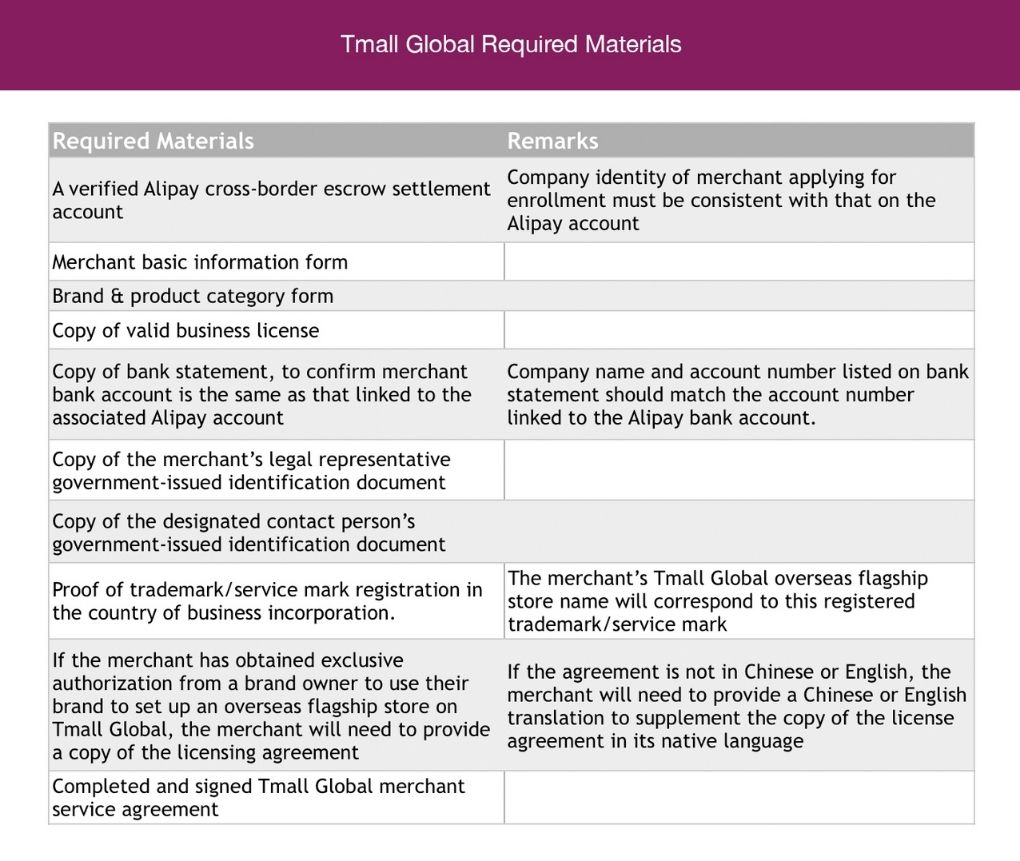
According to your situation, you will have to provide different documents to prove the existence of your brand. For more details, you can look at this detailed website.
Different Types of Accounts Available on Tmall Global
There are several types of stores you can register on Tmall Global:
Flagship Store: Only brands with a trademark such as ® or TM can have a flagship store. The brand will have to be represented by the owner of the store, or a representative of the brand. The owner of the store must possess all documents from the brand, authorizing the setting up of such a store on Tmall’s platform.
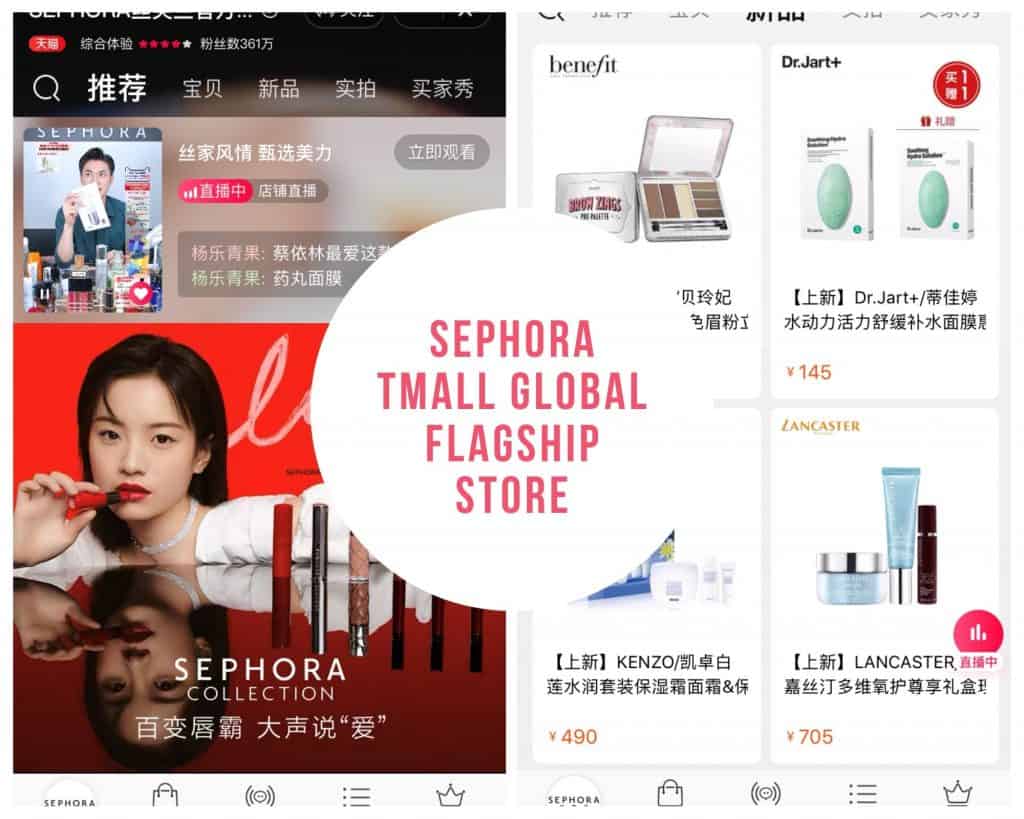
Specialty Store: Merchants holding a brand’s distribution rights to sell without any geographical restrictions in China are able to open this store format. Specialty store types may sell products of up to two categories
Monopolized store: Merchants who own brand licensing goods are allowed to open a monopolized store in Tmall. Retailers can sell 2 or more goods in several categories.
How much does it cost to be on Tmall Global?
You have to take into account that Tmall’s fees will depend on your sector of activities as well as several other criteria. Just so you know, opening a store on Tmall can be considered extremely expensive. That’s why you have to do research beforehand in order to see if the ROI will cover all the expenses and will be enough according to your expectations. Of course, you can contact us to discuss it.
To give an idea of the fees on Tmall Global:
Tmall Global requires a deposit between US$8,000 to US$25,000 depending on the store format. The e-commerce platform also charges an annual service fee, which varies according to the product category which can be between US$5,000 or US$10,000.
However, marketers can be exempted from these charges, or pay only half or the full-service fee if they reach Tmall’s predefined sales target. In addition, Tmall keeps 5% of the sales value as a commission.
If you want more detailed information about Tmall Global, here’s a document explaining all you have to know about Tmall Global, according to your situation.
Benefits of Having an Account on Tmall Global
- Market Entry without Physical Presence: International brands can sell in China without a physical presence in the country.
- Faster Market Entry: Tmall’s established infrastructure reduces the time required to enter the Chinese market.
- Direct Sales Channel: Streamlined channel for overseas retailers to sell directly to Chinese consumers.
- Simplified Logistics: Tmall Global offers logistics solutions for international order shipment.
- Marketing Opportunities: Options for marketing products in China to increase brand exposure.
- Integration with Chinese Payment Systems: Connect with Chinese online payment systems for seamless transactions.
- Increased Brand Trust: Tmall Global instills confidence in Chinese consumers, leading to higher sales.
- Mobile App Access: Reach Chinese consumers through Tmall Global’s mobile app.
- Effective Marketing Tool: Tmall Global is a valuable tool to access the growing Chinese consumer market.
- Assurance for Chinese Consumers: Selling on Tmall Global reassures Chinese consumers, increasing purchase confidence.
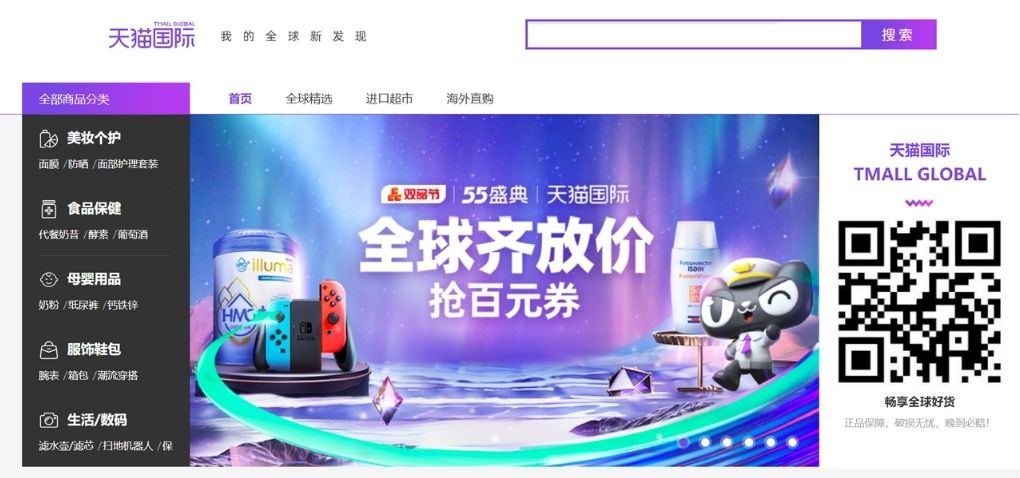
Enhancing Your Tmall Store: Tips for Design and Customization
To thrive in the competitive e-commerce market, designing an appealing and user-friendly Tmall store is vital. Follow these tips to create a captivating and easy-to-navigate store that attracts more customers:
- Visual Appeal: Use high-quality product images and videos to showcase your brand and products. Captivating visuals leave a lasting impression and reflect your brand’s identity.
- Mobile Optimization: Prioritize mobile optimization for China’s mobile-first market. A seamless mobile browsing experience is essential, as most Chinese consumers shop on their smartphones.
- Simplicity with Focus: Avoid clutter and overwhelming product options. Simplify navigation and highlight key features to help customers find what they need easily.
- Branding Consistency: Customize your Tmall store’s appearance to align with your brand identity. Use consistent colors, fonts, and logos for brand recognition.
- Enable Customer Reviews: Positive reviews build trust. Encourage customers to leave feedback, boosting sales conversion rates.
- Excellent Customer Support: Offer clear contact information and quick response times for inquiries. Exceptional customer service contributes to positive shopping experiences.
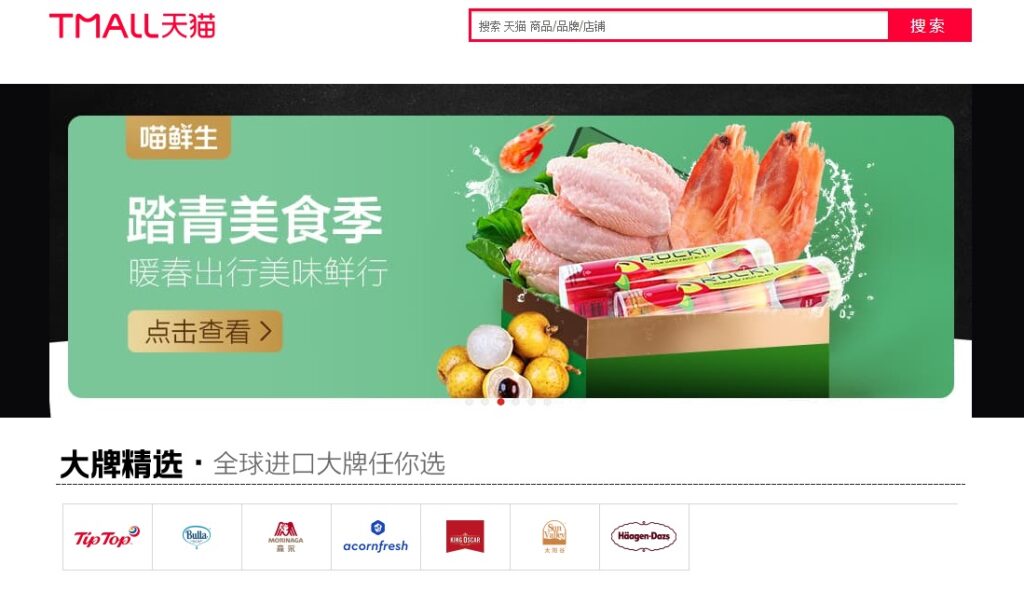
Mastering Effective Marketing and Promotional Strategies on Tmall
To make your Tmall store stand out and attract a wide audience, implementing strong marketing and promotional tactics is essential. Utilize Search Engine Optimization (SEO) to enhance your store’s visibility in Tmall’s search results by incorporating relevant keywords into your product listings.
Take advantage of Tmall’s marketing tools, like banner ads and flash sales, and leverage digital marketing campaigns on popular social media platforms like WeChat and Weibo. These efforts will bolster your brand’s visibility and engagement with customers. Prioritizing exceptional customer service will also foster trust and loyalty among your audience.
Create exclusive promotions and harness user-generated content to create excitement around your brand and encourage purchases. Collaborating with industry Key Opinion Leaders (KOLs) can significantly boost brand awareness and credibility. By implementing these strategies, your Tmall store will thrive in the competitive market.

Logistics and Customer Service in China’s E-commerce Landscape
In the booming e-commerce market of China, logistics plays a pivotal role. Efficiently managing warehousing, categorization, packaging, and transportation ensures smooth order fulfillment for customers.
Statistics reveal that fast and reliable delivery is a key factor influencing consumer purchasing decisions on platforms like Tmall Global and cross-border e-commerce in China. As a marketing manager targeting the Chinese market, understanding the costs and risks related to logistics in cross-border e-commerce is crucial.
Prioritizing supply chain management and optimizing logistics processes can boost customer satisfaction, build trust, and drive sales success for your cross-border business when catering to Chinese customers online.
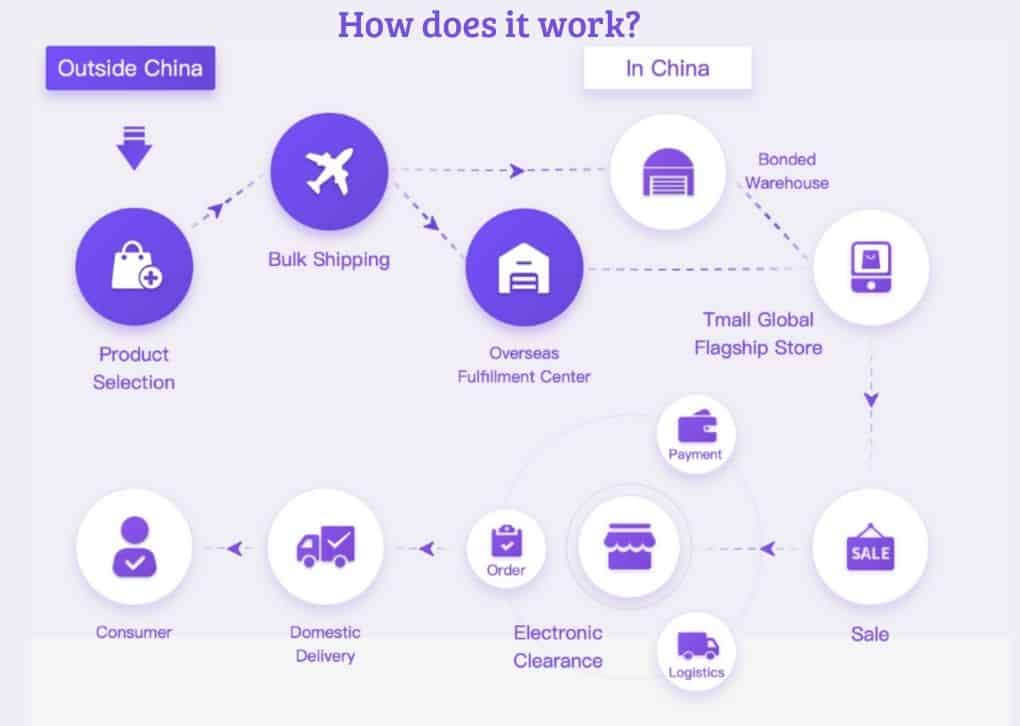
In the Chinese market, excellent customer service is the foundation for establishing trust and loyalty with your customers.
Timely dispatch and delivery hold significant value in China. Ensuring a smooth and efficient logistics system is crucial to meet these expectations. Offering free returns within seven days, without requiring explanations, is now a standard practice among Chinese retailers. Adopting this policy can enhance your appeal to customers.
Providing Chinese language support for Tmall Global customers is vital. Effective communication in their native language fosters rapport and streamlines the buying process. A responsive and reliable team handling inquiries promptly enhances the overall customer experience.
By embracing these customer service considerations on Tmall, you’ll deliver an exceptional shopping experience, build a positive reputation in the market and foster lasting customer relationships.
Contact us to Register Your Merchant Account on Tmall
Looking to open and optimize a Tmall store? As a certified Tmall partner, our agency is your perfect guide. Navigate Tmall’s complexities while seizing countless opportunities with our strategic assistance.

Our experienced team, well-versed in the Chinese market, tailors winning strategies for your brand’s standout presence. From store setup to marketing campaigns, we cover all aspects of Tmall’s success.
Understanding your brand’s unique needs, we ensure your Tmall store aligns with your business objectives. Employing a data-driven approach, we optimize listings, harness Tmall’s marketing tools, and implement customer engagement strategies to attract and retain customers.
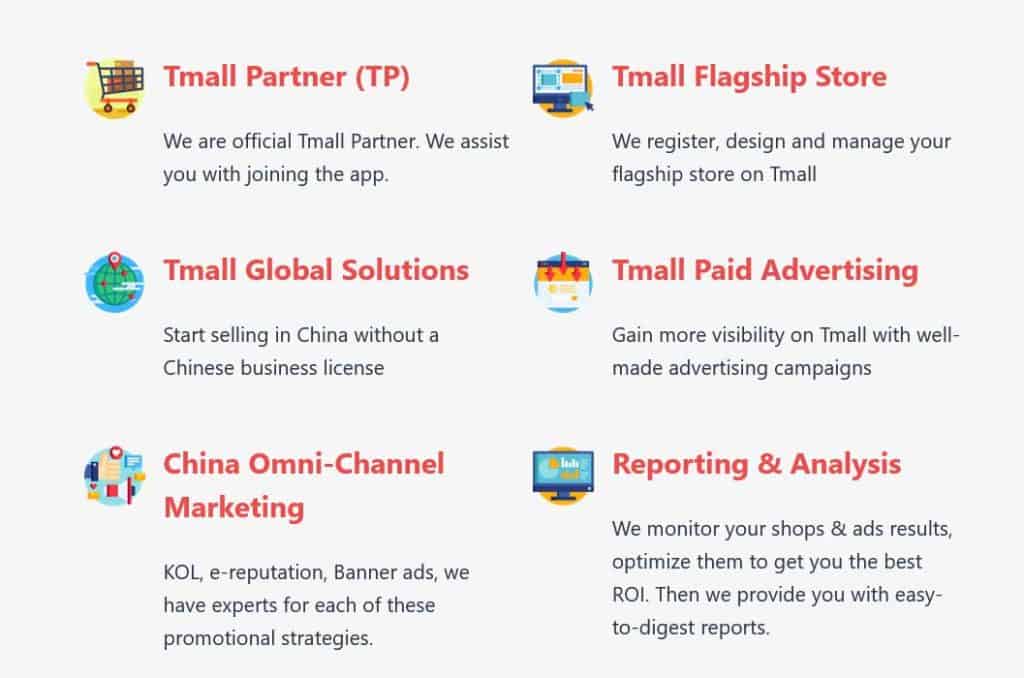
Don’t hesitate to leave us a comment or contact us, so that we can help you start selling your products on Tmall!

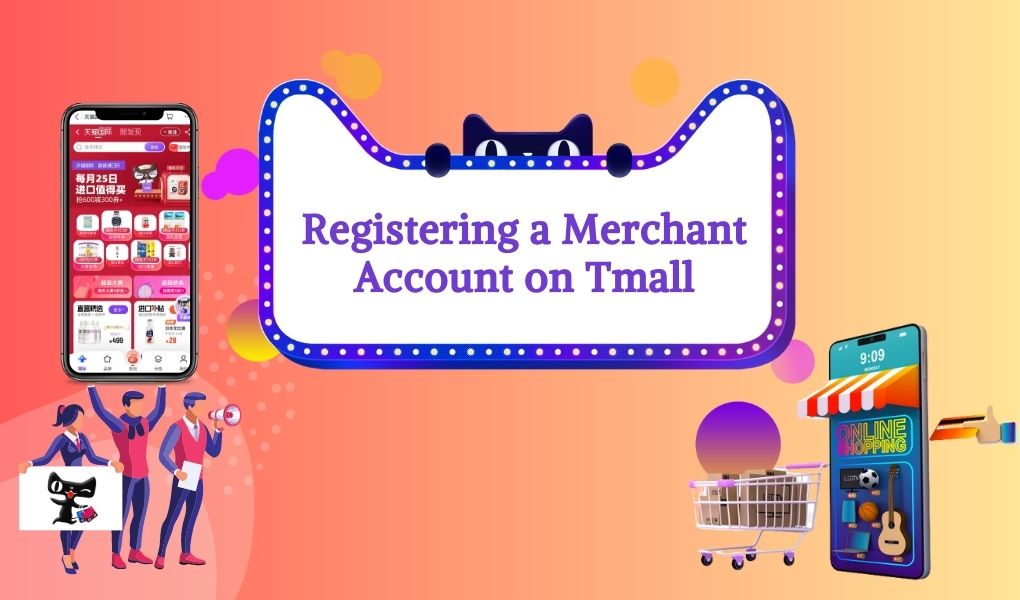


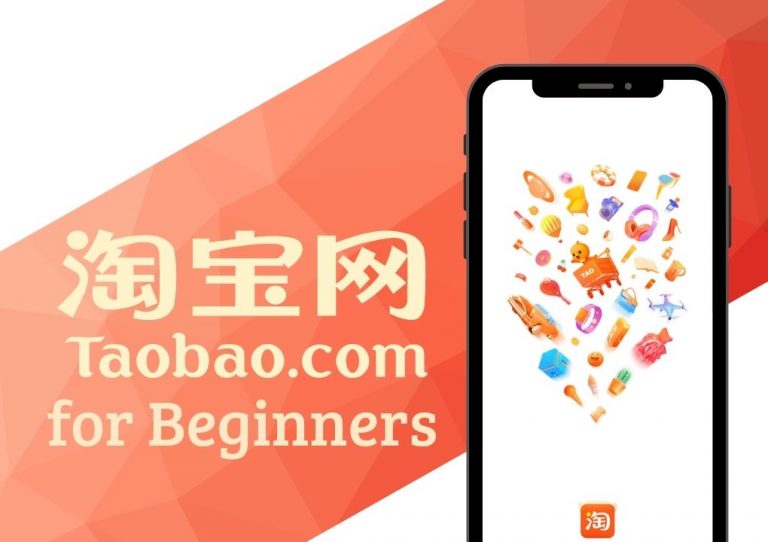


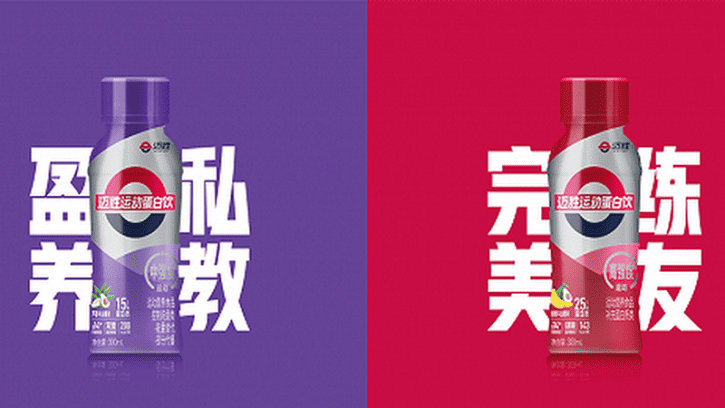
Hello I want to Open Tmall.hk I suppose it is the sae as Tmall Global or it is totally different ?
I would like to sale dried longan in chinese website. Can you suggest me how to register to sale.
A great guide, how much it cost to open Tmall Store ?
Great article, thank you.
I have made some researches related to open tmall Store
It is different from tmall global store ? Do you have translate tmall to english version ?
You guys have or not a Guide to sell on tmall
And a guide to set up a tmall store and tmall cross border Store…
Can you give to me the tmall fulfillment ?
amazing article. Tmall , the total transaction volume on its e-commerce plaform alibaba during the ‘Double 11’ shopping festival was 540.3 billion yuan ($84.448 billion), hitting a new high.
On November 11, the accumulated order value for transactions on JD.com
, another Chinese e-commerce platform, during the Double Eleven festival had exceeded 349.1 billion yuan ($54.564 billion).
Como faço para entrar no mercado digital da Tmall560?